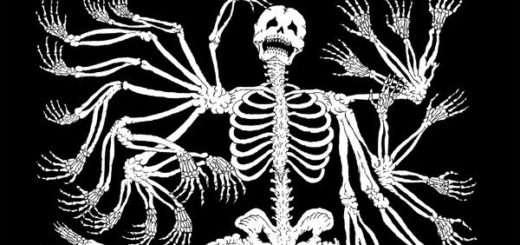Committing Career Suicide: A Metal Fandom’s Reaction to Change


I have covered internet outrage before on Crossfader, but that was in the context of die hard fans attacking a reviewer. While it was certainly extreme, it wasn’t the only time that the blue side of the like bar had lost the battle against the invading dislikes. Any negative review is bound to get backlash, and the dislike button exists both for a reason for anyone to use at their discretion. However, what is even more intriguing is when the fans turn on the musicians themselves. And boy oh boy, has the recent Suicide Silence affair been a truly fascinating little case study.
A little background: Suicide Silence are one of the biggest deathcore bands making music today. They weren’t especially ambitious or bringing anything new to the table, but they were very technically proficient, and lead singer Mitch Lurker was a competent shrieker and growler. Three albums into their career, Lurker died from injuries sustained in a motorcycle accident, and the band picked up a new lead singer in the form of Hernan Hermida, of fellow deathcore band All Shall Perish. In 2014, Suicide Silence released their fourth album, YOU CAN’T STOP ME, and it didn’t seem like much had changed.Their double bass pedals and head bang-generating breakdowns were still intact, and Hermida proved he could stand toe-to-toe with Lurker in terms of range and power. It wasn’t anything new for the band, but it proved that even with a new vocalist, the band hadn’t forgotten what had gotten them so much praise in the first place.
In 2017, the band released two new singles, “Suicide” and “Doris,” for their eponymous fifth album, both of which have been absolutely torn apart by fans for a sudden shift into clean vocals and Korn-esque nu metal. Popular metal-themed YouTuber Jared Dines has made two videos, both of which have almost as many views as the singles themselves, where he relentlessly mocks them, and fans even made a petition to stop Suicide Silence from releasing the album with about 5,000 signatures (it was later revealed to have been created as a prank by a Facebook page). The album in question is even called SUICIDE SILENCE, indicating that the band is turning a page in their career and want this album to define it. The band have been good sports in all of this, with Hermida telling Loudwire Magazine, “I go and I read all of the comments, so please give me everything you’ve got, because I love it. I love every second of it,” and members of the band doing a “reading mean comments” segment with Metal Injection.
Internet outrage has been common in movies, TV shows, and video games, but it seems to be much rarer in the case of music. The technical quality of “Doris” and “Silence” aside, I want to use this fan reaction to illustrate other cases of rock and metal bands making significant sonic shifts, and why they didn’t face the same repercussions as Suicide Silence. This isn’t attacking Suicide Silence for wanting to go in a new direction, or saying these other bands are better than them; I just feel there are numerous factors outside of actual quality that helped contribute to those thousands of dislikes.
Bands get a lot of say in the types of fan they get
This is a rather obvious point, but the music you make changes who your fan base is. It’s simple supply and demand; the band supplies something, and people who want said something will flock to them. However, one interesting point is the way in which you cultivate a fanbase resistant or open to change. I don’t think there’s a single metal band that has cultivated a fan base more accepting of change than Mastodon.
One of Mastodon’s very first EPs contained samples of the Nuremberg Trial. They made a concept album about Moby Dick, later followed by an album involving astral projection and Rasputin. They used vocoder on BLOOD MOUNTAIN. They even released a music video that involved twerking. They are obviously an extreme case, but Mastodon have demonstrated an ability to appeal to both metal and non-metal fans by assembling an ambitious, technically proficient, yet still accessible body of work that refuses to stagnate or do something expected. It has gotten to the point where their fans are so open-minded that they simultaneously enjoy the band’s most dumbed-down and simple work, like the weaker material off THE HUNTER and ONCE MORE ROUND THE SUN, alongside their more conceptual work.
In hilariously mismatched contrast, Suicide Silence has made four very similar albums. Regardless of genre, if you make the same album over and over again, you’re going to only attract fans who simply want that same album ad infinitum. You can’t wait four albums to make noticeable changes, because by then the people who wanted change have jumped off the bandwagon. Sure, the lead singer changed, but that didn’t provide a radical enough change to prepare audiences for the band’s wildly divergent work in the future. It’s a rare of case of too much, too late, and a strange case of the band misjudging their audience.
Be careful about stepping out of genre lines
Style can be firmly entrenched in a particular genre, or it can be completely free from it. If you don’t stick close to a particular genre, you’re more likely to build a fan base that accepts stylistic changes and wants to listen to your band and the music you deliver. The problem comes when style and sound are completely intertwined by sticking too close to a particular genre. The reason that people enjoy your music is because they like the genre, not because they like the band playing it.
For example, Poets of the Fall have adopted numerous musical styles over their seven albums. They have dabbled in symphonic rock, grunge, alternative metal, gothic rock, ‘80s synthpop, and even Maroon 5-esque pop rock. However, through it all they have maintained their unique core: cryptic lyricism that turns the ordinary into the extraordinary, while still maintaining genuine human drama as well as powerful, emotive vocals. This core is so strong and well-defined that it can carry them through records with somewhat lackluster music, like the colorless CLEARVIEW, and even fans of the band who don’t enjoy the genres I just listed have something to enjoy in that central core.
Suicide Silence has found themselves in the opposite situation. They have delivered four albums of meat-and-potatoes deathcore that cemented them as one of the biggest members of the genre. They weren’t unique lyricists or especially flashy musicians, so the main reason people liked them was not because they were a great band, but because they were supplying a demand for deathcore. Now that they’re incorporating way more clean vocals and attempts at Deftones-esque atmosphere, fans don’t have anything to latch on to, because they’re no longer members of their preferred genre. Suicide Silence would have to have a huge amount of talent and skill to change their entire core of simply being a deathcore band, and “Suicide” and “Doris” don’t showcase anything that would indicate such talent.
Change can occur over time or immediately
For another example of an extreme metal band making a deliberate move toward more accessible music, look at Sweden’s In Flames. They are considered a forefather of melodic death metal, combining the screams of death metal with more melodic, yet still heavy, guitar work out of British influences such as Iron Maiden, and generally less violent and nihilistic lyrical topics. However, around the mid-2000s the band started making slow, deliberate steps toward accessibility and atmospheric, electronic-tinged alt-metal. Album after album, their sound became much more tame and tailored for a mainstream rock radio audience that enjoys Incubus and Linkin Park over At The Gates. Their newest album, BATTLES, is easily the most guilty of this, with far too much overdubbing and post-production, and embarrassingly cheesy choruses that had to have been generated from a Generic Stadium Chants assembly machine.
There has certainly been fan backlash, but the most important thing to note here is that this has been a very gradual process. It wasn’t like the band released a melodic death metal album one day and followed it up immediately with BATTLES; they have been making this transition for about 15 years now, giving people plenty of time to jump off the In Flames train when they began to see it as too “Americanized.” Furthermore, their sound was originally built on cleaner, more ear-wormy guitar melodies and riffs, so it wasn’t as much of a stretch to make their entire sound cleaner and more ear-wormy.
Deathcore is a harsh, ugly genre obsessed with delivering a noisy and in-your-face experience, so making a transition toward more accessible alt-metal that wants to deliver a simple dynamic blend of atmosphere and aggression creates a much wider gap to jump across. As opposed to fellow deathcore-turned-electronic-tinged-nu-metal band Bring Me The Horizon, this is not something they experimented with on previous records in spots and have decided to expand to be their entire style: this whole album is the experiment, and it shouldn’t be a surprise that the fans resent that they aren’t getting an album as much as they‘re getting an experiment.
It’s hard to break someone out of a particular taste or attitude
We live in a world that loves to classify things, and music is no exception. The inevitable end result of classification is placing participants into a hierarchy of quality that causes some things to naturally be thought of as better than others. To stingy non-metal fans, metal is thought of as requiring no skill or technical ability, simply consisting of angry white dudes screaming like a demon from the pits of hell. What metal is to non-metal fans, nu metal is to metal fans.
I once heard a quote that said something 10 years old is dated, but 20 years old is classic. In this case, nu metal is in a horribly awkward place, since it ruled the world from about 1997 to 2001, with 2003’s METEORA being considered the swan song of the genre. Nu metal is in that horrible place where enough time and space has passed for rose-tinted goggles to start appearing on a handful of people’s faces, but a person without goggles is likely to be utterly confused on how goggles-wearing music fans look at the world.
It’s what makes Suicide Silence’s transition to something inspired by nu metal all the more baffling. It’s one thing for a band to glide from a niche genre to the mainstream, because there’s probably way more potential money in the mainstream. However, the fact that Suicide Silence wanted to make an album in a genre far past its commercial prime and one that has become such a musical punchline indicates that this is the music they really want to make. Perhaps the ultimate reason for this whole debacle is that when such a huge disconnect exists between what an artist wants to do and what their existing fanbase expects from them and wants to hear from music in general, the inevitable end result is, well, almost 29,000 dislikes.



